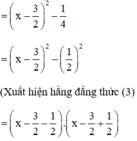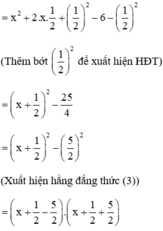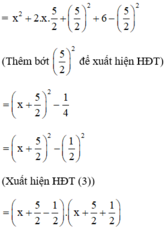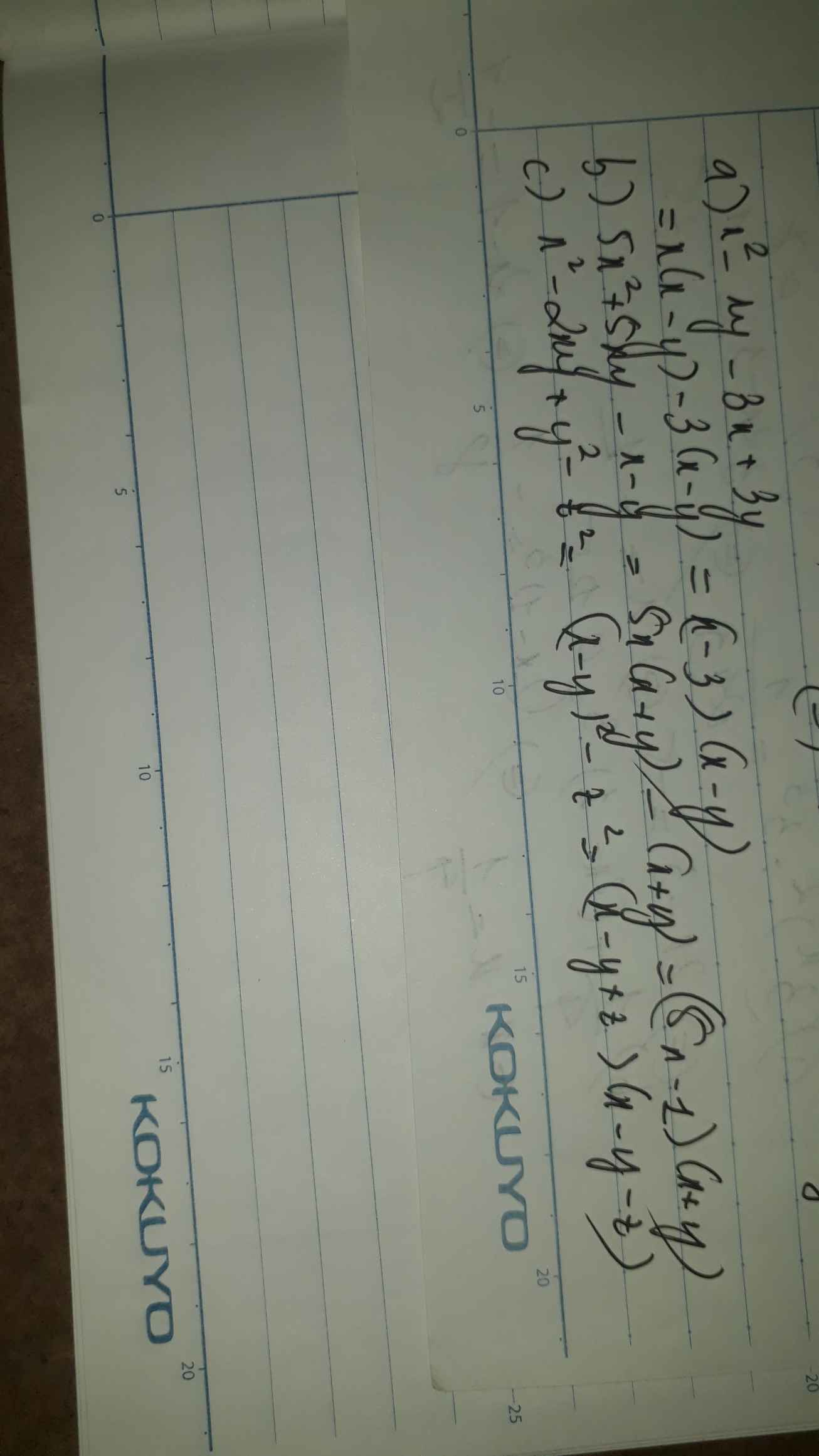x2-3x-28 thành nhân tử
Hãy nhập câu hỏi của bạn vào đây, nếu là tài khoản VIP, bạn sẽ được ưu tiên trả lời.


\(3x-3y+x^2-y^2\)
\(=\left(3x-3y\right)+\left(x^2-y^2\right)\)
\(=3\left(x-y\right)+\left(x-y\right)\left(x+y\right)\)
\(=\left(x-y\right)\left(x+y+3\right)\)

1: \(-x^2+2x+8\)
\(=-\left(x^2-2x-8\right)\)
\(=-\left(x-4\right)\left(x+2\right)\)
2: \(2x^2-3x+1=\left(x-1\right)\left(2x-1\right)\)

`
` x^2 – 3x + 2`
`= x^2 – x – 2x + 2` (Tách `–3x = – x – 2x)`
`= (x^2 – x) – (2x – 2)`

Cách 1: Tách một hạng tử thành tổng hai hạng tử để xuất hiện nhân tử chung.
a) x2 – 3x + 2
= x2 – x – 2x + 2 (Tách –3x = – x – 2x)
= (x2 – x) – (2x – 2)
= x(x – 1) – 2(x – 1) (Có x – 1 là nhân tử chung)
= (x – 1)(x – 2)
Hoặc: x2 – 3x + 2
= x2 – 3x – 4 + 6 (Tách 2 = – 4 + 6)
= x2 – 4 – 3x + 6
= (x2 – 22) – 3(x – 2)
= (x – 2)(x + 2) – 3.(x – 2) (Xuất hiện nhân tử chung x – 2)
= (x – 2)(x + 2 – 3) = (x – 2)(x – 1)
b) x2 + x – 6
= x2 + 3x – 2x – 6 (Tách x = 3x – 2x)
= x(x + 3) – 2(x + 3) (có x + 3 là nhân tử chung)
= (x + 3)(x – 2)
c) x2 + 5x + 6 (Tách 5x = 2x + 3x)
= x2 + 2x + 3x + 6
= x(x + 2) + 3(x + 2) (Có x + 2 là nhân tử chung)
= (x + 2)(x + 3)
Cách 2: Đưa về hằng đẳng thức (1) hoặc (2)
a) x2 – 3x + 2

(Vì có x2 và  nên ta thêm bớt
nên ta thêm bớt  để xuất hiện HĐT)
để xuất hiện HĐT)

= (x – 2)(x – 1)
b) x2 + x - 6

= (x – 2)(x + 3).
c) x2 + 5x + 6

= (x + 2)(x + 3).

Ta có: \(x^2-3x-28\)
\(=x^2-7x+4x-28\)
\(=x\left(x-7\right)+4\left(x-7\right)\)
\(=\left(x-7\right)\left(x+4\right)\)

Bài 2:
a: \(x^2+5x-6=\left(x+6\right)\left(x-1\right)\)
b: \(5x^2+5xy-x-y\)
\(=5x\left(x+y\right)-\left(x+y\right)\)
\(=\left(x+y\right)\left(5x-1\right)\)
c:\(-6x^2+7x-2\)
\(=-6x^2+3x+4x-2\)
\(=-3x\left(2x-1\right)+2\left(2x-1\right)\)
\(=\left(2x-1\right)\left(-3x+2\right)\)
1.
a) \(=x^2\left(x^2+2x+1\right)=x^2\left(x+1\right)^2\)
b) \(=\left(x+y\right)^3-\left(x+y\right)=\left(x+y\right)\left[\left(x+y\right)^2-1\right]\)
\(=\left(x+y\right)\left(x+y-1\right)\left(x+y+1\right)\)
c) \(=5\left[\left(x^2-2xy+y^2\right)-4z^2\right]=5\left[\left(x-y\right)^2-4z^2\right]\)
\(=5\left(x-y-2z\right)\left(x-y+2z\right)\)
2.
a) \(=x\left(x+2\right)+3\left(x+2\right)=\left(x+2\right)\left(x+3\right)\)
b) \(=5x\left(x+y\right)-\left(x+y\right)=\left(x+y\right)\left(5x-1\right)\)
c) \(=-\left[3x\left(2x-1\right)-2\left(2x-1\right)\right]=-\left(2x-1\right)\left(3x-2\right)\)
3.
b) \(=2x\left(x-1\right)+5\left(x-1\right)=\left(x-1\right)\left(2x+5\right)\)
c) \(=-\left[5x\left(x-3\right)-1\left(x-3\right)\right]=-\left(x-3\right)\left(5x-1\right)\)
4.
a) \(\Rightarrow\left(x-1\right)\left(5x-1\right)=0\)
\(\Rightarrow\left[{}\begin{matrix}x=1\\x=\dfrac{1}{5}\end{matrix}\right.\)
b) \(\Rightarrow2\left(x+5\right)-x\left(x+5\right)=0\)
\(\Rightarrow\left(x+5\right)\left(2-x\right)=0\)
\(\Rightarrow\left[{}\begin{matrix}x=-5\\x=2\end{matrix}\right.\)

a: Ta có: \(x^2-xy-3x+3y\)
\(=x\left(x-y\right)-3\left(x-y\right)\)
\(=\left(x-y\right)\left(x-3\right)\)
b: Ta có: \(5x^2+5xy-x-y\)
\(=5x\left(x+y\right)-\left(x+y\right)\)
\(=\left(x+y\right)\left(5x-1\right)\)
c: Ta có: \(x^2-2xy+y^2-z^2\)
\(=\left(x-y\right)^2-z^2\)
\(=\left(x-y-z\right)\left(x-y+z\right)\)

a) \(x^2-y^2-3x+3y\)
\(=\left(x-y\right)\left(x+y\right)-3\left(x-y\right)\)
\(=\left(x-y\right)\left(x+y-3\right)\)
b) \(2x+2y-x^2+y^2\)
\(=2\left(x+y\right)-\left(x^2-y^2\right)\)
\(=2\left(x+y\right)-\left(x-y\right)\left(x+y\right)\)
\(=\left(x+y\right)\left(2-x+y\right)\)
c) \(x^2-16+y^2+2xy\)
\(=x^2+y^2+2xy-16\)
\(=\left(x+y\right)^2-16\)
\(=\left(x+y+4\right)\left(x+y-4\right)\)
a) \(x^2-y^2-3x+3y\)
\(=\left(ax+y\right)\left(ax-y\right)-3.\left(x-y\right)\)
b) \(2x+2y-x^2+y^2\)
\(=2\left(x+y\right)-\left(x+y\right)\left(x-y\right)\)
c) \(x^2-16+y^2+2xy\)
\(=\left(x+y\right)\left(x-y\right)+2xy-16\)

\(=x^2+4x-7x-28=\left(x+4\right)\left(x-7\right)\)
=(x+4)(x-7)